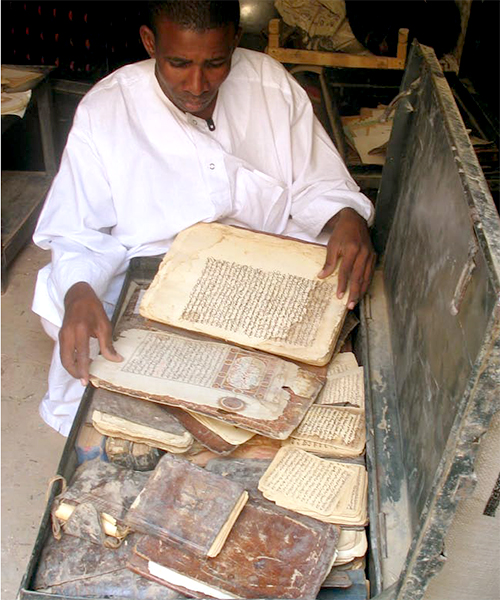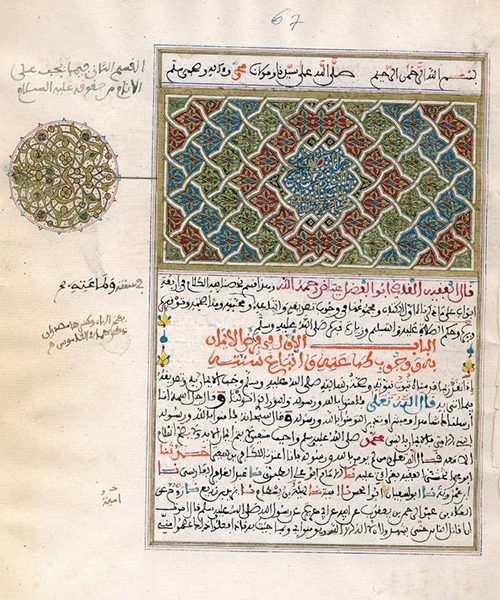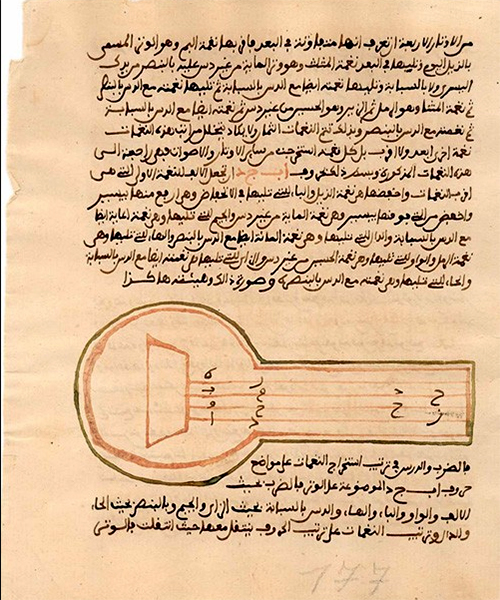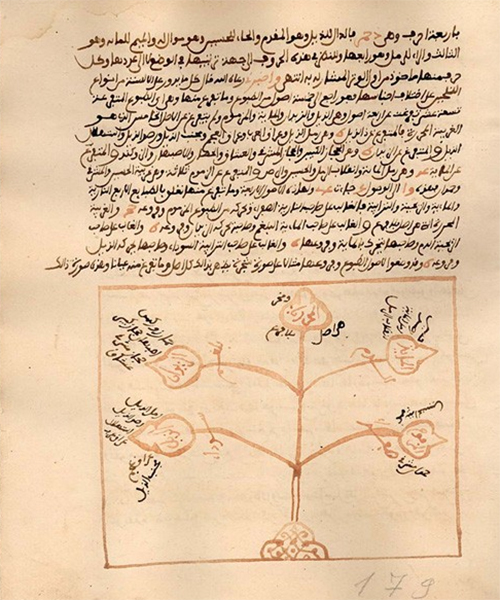The situation in Mali as I understand it: May 7 – June 29, 2012
June 29, 2012, New York City

The Problem
In March of this year there was a coup d’etat in Mali and the three regions in the north of Mali are under the control of several groups of armed rebels. The current crisis calls into question the entire period of the supposed Malian “model democracy” because of the widespread corruption and cronyism that underlies the current crisis.
On March 21st, disgruntled military officers went to the president to complain and ended up with a coup. The coup caused an institutional crisis in the south and awakened the general population to the depth of the corruption. Maybe it is the final straw, the result of the weight of corruption which had become too heavy after 10 or 20 years – the whole period of the supposed model “democracy”.
On January 17th, 2012, rebels newly in possession of heavy arms from the dissolution of Khadaffi’s army in Libya decided this was their moment. In April, the rebels in the north declared the independent state of AZAWAD in April. This declaration was universally ignored by the international community.
What is the role of huge oil reservoirs discovered long ago in the north of Mali which have never found its way to the surface? And other mineral deposits including uranium and gas ?
Mali is very complicated- A little history
It always has been and probably always will be. Mali has a still active history that goes back to at least the 4th century. Even a real understanding of Malian politics during the last 50 years since independence is nearly impossible and that only gets you to 1960.
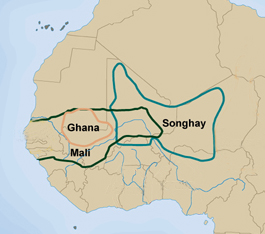
The Ghana, Mali & Songhay Empires
Mali has a long and illustrious past as an integral part of great African empires. The first of these empires was the empire of Wagadu(Ghana) which from the 4th to the 11th century controlled the trans-Saharan caravan routes. The Mali Empire reached its pinnacle of power and wealth during the 14th century, extending over almost all of West Africa and controlling virtually all of the rich trans-Saharan gold trade. It was during this period that Mali’s great cities, Timbuktu and Djenne, became fabled centers of wealth, learning, and culture. When the emperor Mansa Musa made his pilgrimage to Mecca in 1324, he dispensed so much gold that the world gold price was depressed for two years. In the 15th century the Mali empire fell to the Songhai, who had established their capital at Gao.
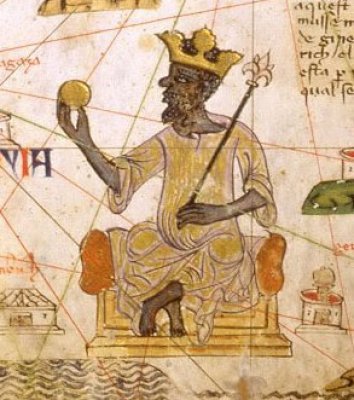
Mansa Musa
Mali has a long history of solving disputes by talking. This talking rarely takes place in a European language. Mali is a place where one’s reputation, honor, word are of paramount importance. Malians are patient, generous, and excellent observers. They are also stubborn and not afraid of hardship especially in service to honor and noble ideals.
Sinankuya or the system of joking cousins is a Malian practice that stems from the founding of the Mali Empire in 1235. It involves the whole population, young and adults, rich and poor, employers and employees. It is a factor of social balance that facilitates Mali’s internal non-violence amongst its ethnically diverse population. Malians use this joking relationship to promote social cohesion, circumvent the power of the state, provide opportunities for economic gain, and preserve cultural histories and identities.
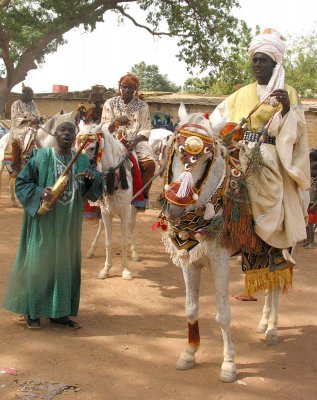
Malians have very long memories. Perhaps this comes from their long oral rather than written tradition. When we write things down, we don’t need to remember them. We can always look them up. But without writing, people need to remember. The job of the griots- Mali’s oral historians, spokespeople and negotiators — is to remember.
Intermingled traditional and contemporary issues influence current life in Mali. The current crisis cannot be understood without understanding the ongoing traditions from the three empires stemming from at least the 4th century that inhabited the land that is now the Republic of Mali, as well as Islam, the fading but ever close presence of colonialism and the complexity of globalization.
What is the contribution to this crisis of the colonial period including the conscription of Malian (and other African) soldiers into the French army during WWII? And what of the memories of forced labor during the colonial period? The unaddressed wounds are plenty.
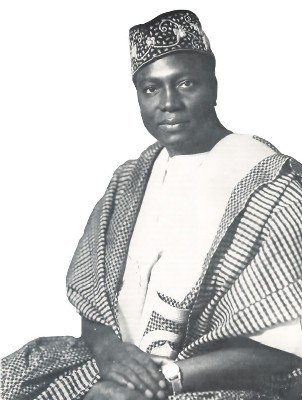
President Modibo Keita, first President of Mali.
Under President Modibo Keita, two years after independence, to be economically independent from France, Mali ceased to use the Franc CFA which was linked to the French Franc. The Malian franc was introduced in 1962 at par with the CFA franc. In 1984, Mali readopted the CFA franc, with 2 Malian francs = 1 CFA franc, tying Mali back into the French economy which is one of the main effects of the currency union. Malians are patient and not afraid of hardship.
Mali may look very chaotic but it is in reality very structured and hierarchical. For example: If there isn’t a griot available to help revolve a given dispute, there is an established chain of command for solving disputes.
The occupation of 2/3 of Mali by armed rebels continues.
A minority group (MNLA) is seeking independence for an ethnic minority (Tuareg) that doesn’t want it, on a piece of land that it has never owned (or ruled) at any point of time in history, in the midst of much larger communities that were never consulted on the matter.
MNLA propaganda tries to separate the MNLA from the other jihadist groups such as the Ansar Dine who are currently imposing sharia law in northern Mali. This is an attempt to attract international sympathy for their separatist claims. In fact the groups are acting together and cannot be separated. This includes AQIM and the drug smugglers.
A link to the full article.
The occupiers can’t seem to unite to save themselves. They don’t have the same aim. But the disagreement is more propaganda. The MNLA can attract international sympathy appealing to misinformed proponents of the “romantic” Tuareg. But the MNLA doesn’t have any money. Just the weapons form Libya. Ansar Dine has money from AQIM, drug trafficking, ransoms on kidnapped foreigners. But not wide sympathy. The Ansar Din Headquarters are in Timbuktu and the MNLA headquarters were in Gao.
The international concern is that the north of Mali is becoming a haven for terrorists and traffickers. This is a regional problem. The ECOWAS mediator, Blaise Campaore, the President of Burkina Faso began talks with the rebels.
Niger’s president, Mahamadou Issoufou, said that Afghan and Pakistani jihadis were training recruits for Islamist groups in northern Mali. Mr. Issoufou said Niger had evidence that Boko Haram, an Islamist group that has become a security threat in Nigeria’s north and fostered links with Al Qaeda’s North African wing, was running training camps in Gao, Mali.
There have recently been reports of unmarked aircraft flying over the Timbuktu. According to the Washington Post, The US military has since 2007 developed a network of air bases in Africa for surveillance missions of Al-Qaeda and other armed groups, using small planes disguised as private civilian aircraft. According to the newspaper, the United States operates from about a dozen bases located around the continent, including sites in Burkina Faso and in Mauritania, to keep an eye on AQIM and other movements.
The Ansar Dine have been busy imposing sharia law.
They have smashed TV sets that were being used to play video games or watch programs considered un-Islamic. They have beat up youth watching television in the street. They have imposed a strict ban on the playing of football. Women are now forced to wear full, face-covering veils. Music is banned from the radio. Cigarettes are snatched from the mouths of pedestrians. A centuries-old monument, the shrine of a 15th-century saint, has been defaced; bars have been demolished; and black flags have been hung around town to honor Ansar Dine. Black billboards with Koranic inscriptions have replaced advertisements. The Ansar Dine are everywhere with their guns. When the Islamists encounter young people of the opposite sex together, they force them to marry on the spot.
On June 20th, an 18 year old couple were each given 100 lashes publicly for having a child out of wedlock. The child could only have been conceived before the Ansar Dine came to town. The whipping was done publicly and a video has been uploaded to Youtube. After the public beating the couple were taken to the hospital and then they were married on the same day!
There have been demonstrations against the armed occupiers by local people in the three occupied cities.
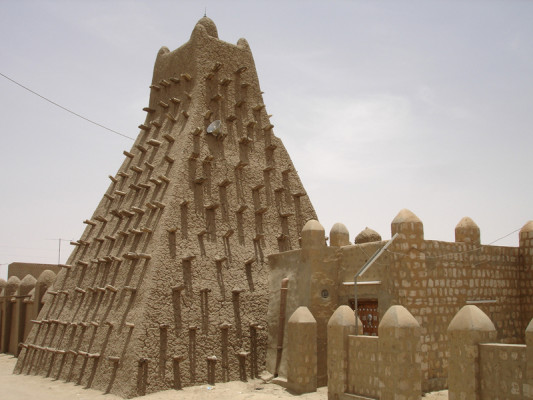
Sankore Mosque in Timbuktu
Timbuktu, now under occupation by Islamist extremists not satisfied with the long sacred history of the city, was an important center of commerce and learning in the Middle Ages dating from the time of the Mali Empire. Timbuktu has been a natural meeting point of Songhai, Wangara, Fulani, Tuareg and Arabs.
Timbuktu has three of the oldest mosques in the world and an important Islamic intellectual and spiritual center. Merchants from northern African cities traded salt and cloth for gold in the markets of Timbuktu. According to the inhabitants of Timbuku, gold came from the south, salt from the north and divine knowledge, from Timbuktu.
During the early 15th century, a number of Islamic institutions were erected. The most famous of these is the Sankore mosque, also known as the University of Sankore. It had 25,000 students in the 16th century and became the center of the Islamic scholarly community in Timbuktu.
University of Sankore was composed of a series of independent schools or colleges, each run by a single master. Students associated themselves with a teacher, and courses took place in the open courtyards of mosque complexes or private residences.
The most outstanding treasure in present day Timbuktu are the 100,000 manuscripts kept by the great families from the town. These manuscripts, some of them dated from pre-Islamic times and 12th century, have been preserved as family secrets in the town and in other villages nearby. The most were written in Arabic or Fulani, by wise men coming from the Mali Empire. Their contents are didactic, especially in the subjects of astronomy, music, and botany. More recent manuscripts deal with law, sciences and history (with unique records from the 16th and 17th century), religion, trading, etc.
The Ahmed Baba Institute, founded in 1970 by the government of Mali, with collaboration of Unesco, holds some of these manuscripts in order to restore and digitize them. More than 18,000 manuscripts have been collected by the centre, but there are an estimated 300,000-700,000 manuscripts in the region.
Private libraries in Timbuktu have also been preserving these manuscripts. At one time there were 120 libraries with manuscripts in Timbuktu and surrounding areas. The full extent of the manuscripts is unknown. There are grave concerns for the protection of this cultural heritage.
An Amnesty International report released on Mali 16th, stated that Mali is facing its worst crisis in the 50 years since independence in 1960. This crisis includes a severe humanitarian emergency, human rights abuses committed by government troops and rebel militias, and international isolation after the military coup two months ago.
A few days ago, on June 27, there was fighting in Gao and the Ansar Dine expelled the MNLA,. The MNLA now has no foothold in the north. Mokhtar Belmokhtar, an Algerian founding member of Al Qaeda in the Islamic Maghreb (AQIM), is believed to have been killed in the fighting.
In the last 6 weeks, the institutional crisis has turned round and round.
The 40 day interim period ended on May 22. Since elections were clearly impossible, ECOWAS decided that the interim president Dioncounda Traore should remain president for a transition period of a year. ECOWAS decided this, in the name of democracy, without consultation with Malians other than Dioncounda Traore himself and others of the “political class” who profited from the regime that was overthrown by the coup in March. In order to get him to step aside, ECOWAS also gave Sanogo, the coup leader the status of a former head of state. He had been granted amnesty for the coup in a previous agreement with ECOWAS.
On May 21 there was a huge march in Bamako, by far the largest march during this whole period. They occupied bridges. Thousands of people marched and rode from the center of town up the steep hill to the presidential palace. When they arrived there, they entered into the palace ground, into the palace and into the presidential office. Marchers beat Dioncounda Traore unconscious. He was finally taken to the hospital in Bamako and then to the hospital in Paris. Three demonstrators were killed by security forces. Why did this happen? Because Malians were upset that Dioncounda Traore was named transition president by ECOWAS without consulting Malians. Dioncounda Traore, long term political figure and head of the National Assembly, is associated with the worst of the abuses of the old corrupt regime. To understand is not to condone but a way to try to arrive at a solution. Dioncounda Traore remains in Paris at this time. It seems that he has set up an office in Paris with secretaries, advisors, attaches. Other members of the ousted ATT regime have also gathered in Paris.
Why the marchers were allowed onto the grounds is the subject of judicial inquiry. Several people have been questioned and arrested. Some have called this an assassination attempt. It was not. If the crowd had wanted to kill him, they would have done so. But they didn’t want him to be president. Some felt that Sanogo had betrayed them by agreeing to the ECOWAS demands.
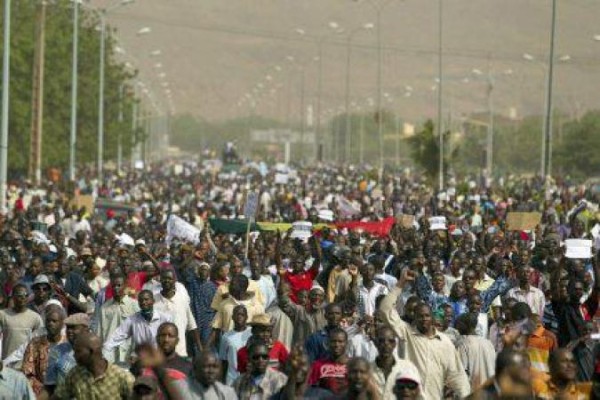
Demonstrators marching to the Presidential Palace, May 21
At the end of May, the African Union and ECOWAS announced they were going to take the Mali situation to the UN Security Council for international military intervention. In mid June the request was sent back for a better defined mission and budget. It was not clear if the intervention would be to protect the “democracy” in the south or send forces to re-gain the north. This has been the confusion all along. ECOWAS’ armed forces do not have equipment nor expertise to wage a desert war or any other kind of war for that matter. And just today, Ambassador Johnnie Carson, the American Assistant Secretary of State Bureau of African Affairs testified before the House Foreign Affairs Committee Subcommittee on African Affairs saying that ECOWAS troops should go to the south rather then the north.
There is the ever present threat of famine due to bad rains last year, 300,000 refugees and internally displaced people and now the added threat of locusts because Libya didn’t spray against them last year when they were in so much turmoil!

Locusts
Mali currently faces an extreme revenue shortfall. Imports and exports have fallen, this has all negatively impacted tax collection and revenues. Donors who provided budgetary support to cover more the half of government expenses have withheld their contributions. Several companies are laying off workers, they are facing difficulties paying their taxes. Mali’s once booming tourism sector has also dried up as visitors stay away over security concerns and travel warnings. Several major hotels in Bamako have closed recently. The French started discouraging tourist travel to Mali several years ago so the once flourishing tourist was already in shambles before the current crisis. South African group Illovo Sugar pulled out of a 2.6 billion rand sugar project in the country, largely due to political risk and funding difficulties. Ranked third among Africa’s gold producing nations, most gold miners operating in Mali such as Randgold Resources, Mali’s largest investor, have shrugged off the crisis and fallout from sanctions and have continued their operations with minimal downtime.
There is currently a legitimate government in place in Bamako
according to the Malian constitution and ratified by the Malian Constitutional Court. There is a President of the Transition, former speaker of the Assembly, who in compliance with the Malian Constitution, became president when the previous president could no longer serve. (Even if many Malians don’t like him because he is associated with the worst of the abuses of the former regime. There is a Prime Minister (who Malians do like because he is not part of the old corrupt club) appointed according to agreement and law and a there is a functional National Assembly.
The Prime Minister, Cheick Modibo Diarra, and his government have popular support in Mali. He was traveled in the region and in Europe meeting with leaders and asking for support. But the international community seems unwilling to take the risk of acting. An opinion poll taken in Bamako in May supports what I have been hearing and reading about support for the coup and for the Prime Minister.
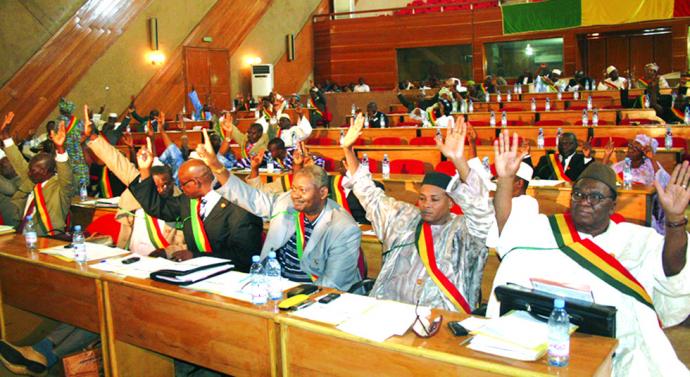
This legitimate Malian government needs and deserves the full support of the international community.
The Malian government- not ECOWAS, not the African Union – deserves support. Support from both these bodies (ECOWAS and the AU) will be welcome if the Malians ask for it but there is no need for the international community and Mali’s neighbors to decide to occupy the south. The Army has asked for arms and equipment, training, logistics and intelligence and said that they can retake the North if this support is provided. In fact, given the revulsion of the local population to the invaders and their increasing application of sharia law, retaking the North could be quickly accomplished with a little outside assistance.
The international community needs to demand full accountability for donor funds to Mali. Misappropriated and stolen funds need to be found and returned. The culture of impunity needs to end and those who benefited illicitly from misappropriation of donor and government funds and from private bribes need to be prosecuted, convicted and jailed. The country needs to be returned to the rule of law and not of nepotism and corruption. In this way the international community can join with the Malian people to demand an end to the corruption and to recover the international funds lost to corruption.
The international community needs to stop worrying about the comings and goings of the coup leaders who are only a potential threat to those corrupt officials and their supporters who are afraid of the dossiers the coup leaders might have on them. The threats of ECOWAS forces in Bamako to protect “state institutions ” is the biggest threat to those same institutions and can go long way to make this a much bigger problem. State institutions need to be protected from those who pillaged them in the past and not returned to the same corrupt actors.
And there cannot and should not be an election before the North is re-conquered because to do so will serve to ratify the occupation. It is inconceivable that an election that excluded half the country would be seen as democratic, even if it could be organized fairly, which is unlikely until the North is reincorporated into the Malian nation. Here’s a separate article on this site about why there should not be elections before the North is re-conquered.
Rather than adding to the institutional crisis and the pressures in Bamako by threatening sanctions and an invasion of foreign (ECOWAS) troops to Bamako ( to secure the “democracy”), the international community should give Mali the time and support to find its own Malian solution. How else can the outcome be a democracy? Is a solution to the crisis was really the objective of the international community? If so, it can only come from Mali itself.
Are foreign troops ever a good idea?
The international community wants to back an ECOWAS military intervention even though it has never been effective in any intervention to date. The Malian army has asked to be equipped to re-conquer the north themselves. They are not adequately armed because monies were diverted to private bank accounts and private stocks of weapons. Many if not most of the nearly 100 generals in the top-heavy Malian army were involved in this looting of the institution; this is one reason why the leadership of the coup is in the hands of lower-ranking officers. If there were movement to recapture the north, the problems in the south would calm as Malians united behind the effort. Unless of course, Mali’s neighbors (ECOWAS) decide to occupy the south, as they have been threatening to do. There is good reason to believe that the Army would oppose such an invasion.
The re-conquering of the north is not as impossible as some seem to believe. The north fell in 72 hours during what I call the collective heart attack weekend with the taking of Kidal, Gao and Timbuktu. If these three cities were to be recaptured, the occupation would be reversed.
Once the North is recaptured, it will be possible to construct a democracy in Mali.
The international community must support Malian Self Determination.
